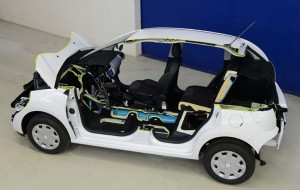If you’ve been to an auto show lately you’re undoubtedly aware of all the new products using batteries, whether conventional hybrids, more advanced plug-ins or state-of-the-art battery-electric vehicles. That said, with all the problems that even the most advanced lithium-ion batteries suffer from it’s no wonder manufacturers are looking for alternatives.
The new fuel cell alliances announced by Toyota and BMW, and by Daimler, Nissan and Ford, show one potentially promising technology. Now, PSA Peugeot Citroen is exploring another. The French automaker is studying a compressed air hybrid system that it might soon offer in one of its subcompact hatchback models.
Peugeot isn’t the only manufacturer looking at hybrid-air technology. Ford explored the concept for use on some of its bigger truck models. But as a statement from Paris indicates, the European maker is seriously moving ahead on a technology that would skip costly batteries and, it contends, might be able to deliver fuel economy nudging into the 80 mile per gallon range.
Peugeot says that the hybrid-air system will make it into production on a B-segment model “starting in 2016.” A more advanced version could follow and bump mileage up to as much as 116 mpg.
Like a conventional hybrid, the technology recaptures energy normally lost during braking or coasting. But instead of converting that into electric current that is then stored in a battery, the system compresses air and stores it in a tank tucked away where a regular hybrid might have its batteries. The system can then tap that stored energy to get a boost when it needs one, say during hard acceleration, or to operate in ZEV, or Zero-Emission Vehicle mode.
Peugeot notes it is not walking away from battery power. It will continue to use its Hybrid4 battery system for larger and more expensive models. But it believes that the Hybrid-Air system is more effective, especially in terms of cost, on smaller vehicles.


I’ve been working on a similar idea for turbo use for a number of years but the challenges are far greater than one might appreciate. Compressed air may be more practical and far safer than lithium-ion batteries in hybrids, let alone cheaper and possibly more reliable, but only time will tell. I hope that fuel cells prove to be the real solution.